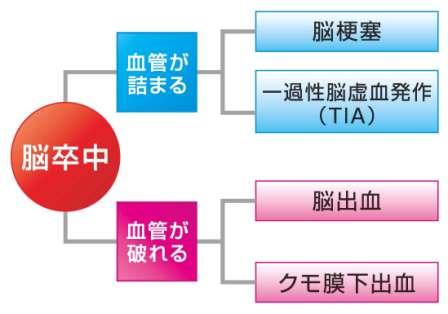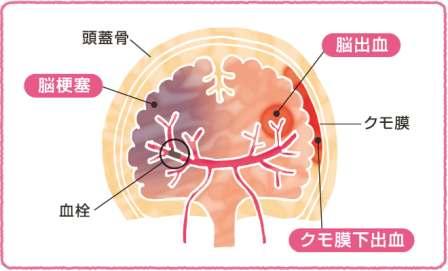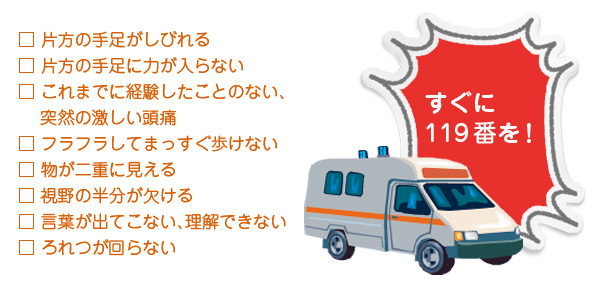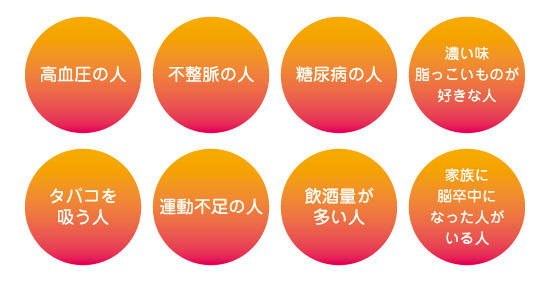- Yokohama-shi Top Page
- Health, medical care, welfare
- Health, medical care
- Medical care
- Cancer, other diseases, etc.
- What is cerebrovascular disease?
- What is cerebrovascular disease?
The text is from here.
What is cerebrovascular disease?
Last updated on March 7, 2025.
![]()
Cerebrovascular disease is a general term for diseases caused by abnormalities in the cerebral artery.
There are many different types of cerebrovascular disease, but the best known is stroke.
Stroke ischemic strokes such as cerebral infarction and transient ischemic attacks (TIA) caused by stenosis and obstruction of blood vessels in the brain, and brain (inside) bleeding caused by broken blood vessels in the brain and subarachnoid hemorrhage. It is divided into hemorrhage.
The following is an illustration of a simple stroke structure and site.


For stroke, proper treatment during severe symptoms can lead to a major improvement in daily life after treatment, so treatment at an emergency medical institution with appropriate medical functions immediately after onset Is important.
![]()
If the following symptoms suddenly occur, there is a risk of stroke.
Please call 119 as soon as possible.
![]()
Some of the causes of stroke are the following diseases and living environments:
If you check multiple items, you may be a reserve for stroke, so be careful.
So, what should I do to prevent stroke?
Let's take a look at it.
People with high blood pressure
If hypertension continues, blood vessels are always subject to great pressure, and blood vessel walls can be damaged and cause cerebral infarction from arteriosclerosis. It can also create aneurysm in blood vessels and cause cerebral hemorrhage and subarachnoid hemorrhage.
As a point of improving your life, if you are obese, you will diet. Reduce salt. There are smoking cessation, moderate alcohol, and exercise.
A person with arrhythmia
The biggest cause of myocardial cerebral embolism (one type of cerebral infarction) is the arrhythmia called atrial fibrillation. Normally, atrial fibrillation is more likely to occur due to hypertension, arteriosclerosis of coronary arteries (vasculars that supply oxygen to the heart), and myocardia, but even healthy people smoke too much, or drink too much alcohol or coffee. Care should be taken because seizures may occur when you get tired. Preventing cerebral infarction requires an anticoagulant called Warfarin.
People with diabetes
If hyperglycemia continues, arteriosclerosis is promoted, arteriosclerosis progresses to thin blood vessels in the brain, making it easier to cause cerebral infarction. Diet and exercise are the key to lowering blood sugar levels.
People who like strong tastes and fatty foods
It is necessary to take a diet that pays attention to salt reduction, fat reduction, energy control, nutritional balance, and dietary fiber.
A person who smokes
It is said that the risk is 2 to 2.5 times higher than those who do not smoke. Smoking can cause nicotine, tar, and carbon monoxide into the body, contract blood vessels throughout the body, increase blood pressure, and lead to ischemic in the brain.
People who lack exercise
If you do not exercise regularly, your blood vessels will become thinner and you will be more susceptible to blood vessel diseases such as hypertension and arteriosclerosis. Conversely, exercising increases the amount of blood sending and eliminates excess cholesterol.
It is necessary to exercise simple exercise and move the body on a daily basis, such as going where you can walk without using a car.
People who drink a lot
Moderate drinking has been recognized for good effects, such as correcting blood circulation, relaxing the body, and promoting appetite, but if you drink too much more than an appropriate amount, obesity, arteriosclerosis, It causes hypertension, diabetes, etc., and increases the risk of stroke.
People who have a stroke in their family
The more people in the family have a stroke, the greater the risk of having a stroke.
This can't be prevented, but it's important to know that it's more dangerous.
Inquiries to this page
Emergency and Disaster Medical Section, Medical Care Bureau Regional Medical Department
Phone: 045-671-3932
Phone: 045-671-3932
Fax: 045-664-3851
E-Mail address [email protected]
Page ID: 893-763-148


 (Image: 31KB)
(Image: 31KB)




